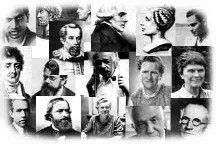Ms.Biscardi ~ Seventh Grade Mathematics
WebQuest

[Great Mathematicians]
Introduction × Task × Process × Learning Advice × Evaluation = Conclusion + Teacher Page[A millimeter computer chip in a man's skull]
We know that there are many men and women who have become famous for their mathematical accomplishments. What makes them so great?
Well,Cyberkinetics Inc., of Foxboro, MA has just received approval from the Food and Drug Administration to begin production of millimeter chips that will be placed beneath the skull of students that are having difficulty passing the math section of the MCAS. If successful, students would no longer have to be concerned about graduation requirements.
Cyberkinetics Inc. has contacted me, Ms Biscardi, to have students research the great mathematicians and select the five most outstanding mathematicians in the history of mankind to have their mathematical knowledge imprinted onto the chips.
Here is your mission if you choose to accept it. You and a partner of your choice will be given the responsibility to choose one of the great mathematicians that you think would be the best choice for having their knowledge imprinted onto a millimeter chip. This is an important task.
You will need to impress the selection committee (a.k.a. teacher – that would be me).
The presentation is designed to prove that the mathematician you and your partner have selected is worthy of the trial. The competition (your classmates), is tough. May the best selections be published in the local newspaper and advertised to the school community. Good Luck!
For further information about millimeter chips access this site:
http://www.cs.colostate.edu/eeg/links.html
In order for your selected mathematician to be considered for the trial you must include the following information in your report and presentation:
1. Name of the renowned mathematician
2. Birth date/ Birthplace (Map)
3. Mathematicians childhood/schooling/education (if possible)
4. Contribution to mathematics and society (an example)
5. Any personal information you find interesting ( who/what inspired this person)
6. A picture of the mathematician
- A PowerPoint presentation (At least 5 slides not more than 10)
- A costume representative of the life and times of the mathematician you have chosen
- A two page written report with a cover page:
* Hand in a 5 inch x 7 inch index card decorated and including basic information of your mathematician.12 Font Arial /Times New Roman/ Black Ink
Double-Spaced
Bibliography of Resources
The card will be used to create a time line.
Return to the top of this page
PROCESS
[Men working at computers]
To be successful in your report and presentation to the selection committee be sure to follow these important steps:
- Plan your time wisely. Report selection of partner and mathematician within 2 days. You will have 3 weeks to complete this project before the competition.
- Choose a partner carefully. Make sure you will work well with them, and share responsibilities equally. (Planning is an important stage of any successful project.) Try to be aware of each others strengths and weaknesses.
- Select a famous mathematician both of you are truly interested in.
- Make sure to include all 6 steps from the “Task” portion of this WebQuest in your report and presentation.
- While researching on the Internet, write down notes (put into a word document) or print hard copies for your paper and presentation as you research.
- Accurate transfer your notes or hard copies (in your own words) to your report and presentation so as to avoid plagiarism.
Check out theseto collect information on the mathematician of your choice!
Indexes of Biographies of Great Mathematicians
This site contains the great mathematicians in an alphabetical or chronological index.
http://www-groups.dcs.st-and.ac.uk/~history/BiogIndex.html
Famous Mathematicians
This site contains biographical information about notable mathematicians.
http://www.looksmart.com/eus1/eus317836/eus317914/eus328800/eus518756/r?l&&hl=3&ss=1&key=famous+mathematicians
Mathematicians of the Seventeenth and Eighteenth Centuries
This site contains accounts of the lives and works of seventeenth and eighteenth century mathematicians.
http://www.maths.tcd.ie/pub/HistMath/People/RBallHist.html
Five Great Mathematicians
This site provides in depth biographical information about five great mathematicians. (Click on the portrait and learn.)
http://teen3.teen.k12.ks.us/why99f/miunru04/Math.htm
Women in Mathematics
This site contains biographies of women in the mathematical sciences and science in general.
http://www.awm-math.org/biographies.html
Famous Math Problems in History
The purpose of this site is to present a small portion of the history of mathematics through an investigation of some of the great problems that have inspired mathematicians throughout the ages.
http://mathforum.org/isaac/mathhist.html
Time Line of Great Mathematicians
This site will show you a chronology of mathematicians between the dates stated. It shows how the lives of the mathematicians overlap.
http://www-groups.dcs.st-and.ac.uk/~history/Chronology/Chronology.html
Mathematicians that share your birthday!
This site contains Mathematicians' anniversaries throughout the year. You can find out who was born and died on the day you were born.
http://www-groups.dcs.st-and.ac.uk/~history/Day_files/Year.html
Careers Involving Math
This site is a listing of essays that describe a wide variety of careers for which a background in the mathematical sciences is useful.
http://www.maa.org/careers/index.html
Do you like math, but don't know what you can do with it when you get out of school? Do you have a job in mind, but don't know how much math education (BS, MS or Ph.D.) you'll need?
http://www.coolmath.com/frm_careers.htm
Math Gallery of Drawings
This site provides you with a guided tour of a picture album of famous mathematicians.
http://www.mathematik.uni-muenchen.de/~kschmidt/album/bild1.html
Do not forget to use Books as references also.
Return to the top of this page
LEARNING ADVICE
[ Picture of a message note]
- Your typed paper should be done in Microsoft Word. Make sure it includes the 6 items outlined in the Task portion of this project.
- Your presentation is to be done in PowerPoint no less than 5 slides and no more than 10.
- Think About: Graphics! Animation! Sound! Picture/s of your Mathematician! and of course... Imagination! Creativity!
Imagination is more important than knowledge.
--Albert Einstein
Return to the top of this page
EVALUATION
[Scattered and open books]
You will assessed/graded on your:
(This project will = 2 Test Grades.)
? Ability to work as a team.
? Accuracy of the facts presented in your paper.
? Quality and creativity of your presentation.
! Check out the following checklists to see more about how you will be assessed:
Paper 30 + PowerPoint 30 + Oral presentation 20 + Costume 15 + Time Line Index Card 5 = 100
TEAMWORK
TYPED PAPER
PRESENTATION
chose an appropriate
partner to work with
used Microsoft Word to do paper
used PowerPoint to do presentation
shared responsibilities equally
accurate facts were presented
had at least 5 slides that correlated directly with the 6 tasks
researched on Internet equally
included a picture of the mathematician on title page
had a picture of the mathematician and other visuals in the presentation
worked on paper equally
all 6 tasks were addressed in paper
included graphics, animation, and sound
worked on presentation equally
was free of spelling and grammatical errors
presentation was creative and costume was well planned
Student Self Evaluation Form
Return to the top of this page
[Two students giving the high five]
Thank you for the time and effort you have shown in your research of the great mathematicians. Because of your efforts the MCAS will no longer be a fear.
You and your partner have worked as a team to research and write a two page paper, design and present a PowerPoint presentation, and hopefully have convinced and persuaded the selection committee to choose your mathematician as one of the great minds to be implanted on a millimeter chip. Do you feel that the contribution of this great mathematician was important? Is learning about mathematics in school important?
The value of achievement lies in the act of achieving.
--Albert Einstein
JUST FOR FUN!! Take this quiz and find out which mathematician is most like you.
Mathematicians Are People Too!
TEACHER PAGE
[A teacher pointing to blackboard.]
Why I chose this topic:
I believe that it is important that students realize that mathematics was a human invention and that it continues to expand and change as the need arises. Mathematics is the "queen" of the sciences and without it our world would lack the order and organization that it gives.
Learning Standards to be Assessed:
"Mathematics as a part of cultural heritage. Mathematics is one of the greatest cultural and intellectual achievements of humankind, and citizens should develop an appreciation and understanding of that achievement." NCTM Principles and Standards (2000).
Massachusetts Instructional Standards
English/Language Arts - Composition Strand 2001
• 24_ Students will gather information from a variety of sources, analyze and evaluate the quality of the information they obtain, and use it to answer their own questions.
• 24.5_Formulate open-ended research questions and apply steps for obtaining and evaluating information from a variety of sources, organizing presenting research.
Instructional Technology - Technology Performance Indicators 2001• 3.6 In keeping with the research process outlined in Standard 24 of the English Language Arts Curriculum Framework, identify electronic sources of information.
• 3.7 Use search engines effectively to find relevant, unbiased, and current information on a subject.
• 3.8 Organize information that is collected using a variety of tools.
• 3.9 Communicate results of research and learning with others using the most appropriate tools.
Rubric generator Clipart
http://rubistar.4teachers.org/ http://office.microsoft.com/clipart/default.aspx
"I have no particular talent, I am passionately inquisitive" --Albert Einstein

